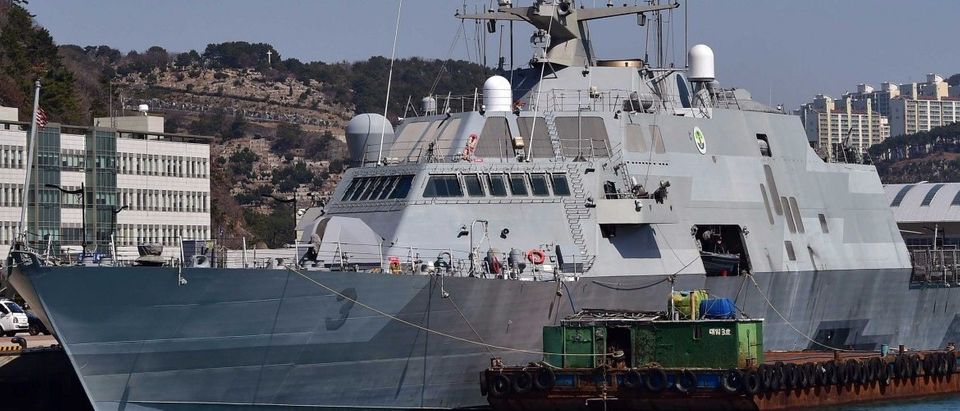An internal government memo has called into question the qualifications of a Navy official who rebuffed the abysmal performance of a Navy littoral combat ship in a recent test.
The USS Coronado, representing the Navy’s next-gen fleet of littoral combat ships (LCS), failed to adequately repel a swarm of speedboats in August and September 2015 in a simulation test meant to mimic Iranian maritime tactics.
The official, commenting on background in late January to Breaking Defense, criticized the test’s efficacy, saying it was unfair the Coronado was not equipped with its full range of weapons.
“The LCS defeated the adversary, right?” the Navy official told Breaking Defense, referring to the onslaught of fast attack ships the Coronado fought off. “How nitpicking is that to criticize, ‘oh, some of them got too close.’ Oh, c’mon. I would call baloney on that.”
“It just seems to me it was an unfair treatment,” the Navy official added.
The memo, originating from Pentagon’s weapons testing agency and obtained by The Daily Caller News Foundation, counters, “Regretfully, the Navy spokesman was apparently not familiar with the basis for the test and many of his statements are incorrect or not related to what was being tested.”
This unnamed Navy official tried to tell Breaking Defense that while some amount of damage was inflicted on the USS Coronado, there are two main problems with the Director, Operational Test and Evaluation’s (DOT&E) report. First, the USS Coronado successfully defeated the swarm. Second, the USS Coronado accomplished this task without the use of a long-range Hellfire missile, which has not yet been installed.
But the internal memo from the DOT&E, which does not list an author, tells a different story.
According to the agency, the Navy had already agreed to the assessment criteria beforehand, meaning that “even though the ship was able to eventually repel the simulated attack, this was after the targets had successfully penetrated the Navy’s prescribed stand-off range, which did not meet the Navy’s success criteria.”
The damage was enough that in a real fight, it might have interfered the ability of the LCS to defend itself.
In short, the Navy has no basis for complaining because the DOT&E relied on scenarios designed by the Navy, as well as success criteria stipulated by the Navy. Additionally, the Navy failed to raise any objections when the same criteria was applied to a previous test in fiscal year 2013.
The lack of the Hellfire missile was inconsequential, as its absence had already been factored into the assessment criteria. The agency notes in the memo, “When the Longbow Hellfire surface-to surface missile is finally added to LCS’s SUW Mission Package in FY 2017, the ship will be tested again, although more robustly, and permitted to use all components of the Mission Package and whatever the Navy prescribed tactics are at the time.”
The Navy official also said that the LCS fought off seven of the eight ships involved, but the memo notes the largest simultaneous attack was composed of three ships.
“The LCS’s ability to defeat a larger raid of small boats will be examined in a future test, which will be conducted in an operationally realistic manner,” the memo added.
The original DOT&E report sparked outrage from GOP Sen. [crscore]John McCain[/crscore] and Democratic Sen. [crscore]Jack Reed[/crscore]. Both wrote a letter to Navy leadership last week blasting the LCS for testing delays and poor performance in the recent test, and asked why Navy Secretary Ray Mabus appeared to be “promoting the warfighting capabilities of the LCS” as recently as three weeks ago.
“We are concerned that Navy leaders are overstating LCS capabilities while understating the current state of the program and the challenging path to achieving the promised capability,” McCain and Reed wrote.
Recently, the LCS embarrassed the Navy again when the USS Fort Worth in Singapore suffered serious gear damage, bringing the ship to a standstill. In December, the USS Milwaukee developed a similar problem, one which may delay the vessel’s entry into active-duty by several months.
The Pentagon is starting to grow weary of LCS problems. Taking note of the LCS’ poor performance and delays, Defense Secretary Ash Carter ordered the Navy to drop production from 52 ships to just 40 in December, with only six ships planned for construction between fiscal years 2017-2020.
Follow Jonah Bennett on Twitter
Send tips to jonah@dailycallernewsfoundation.org.
All content created by the Daily Caller News Foundation, an independent and nonpartisan newswire service, is available without charge to any legitimate news publisher that can provide a large audience. All republished articles must include our logo, our reporter’s byline and their DCNF affiliation. For any questions about our guidelines or partnering with us, please contact licensing@dailycallernewsfoundation.org.


